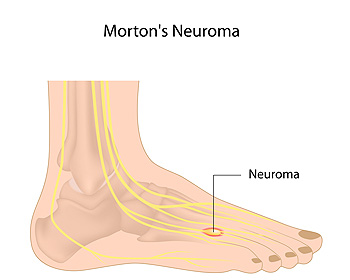 An inflamed nerve that is found below the big toe is often referred to as Morton’s neuroma. Symptoms that may be experienced can include a sharp pain on the bottom of the foot, which may often be accompanied by a burning sensation. Some patients may complain of a tingling sensation or numbness, which may spread to other toes. Walking may become difficult because of the pain that is increased as a result of normal pressure that is exerted on the ball of the foot. A possible cause for this condition to develop may often be associated with wearing shoes that fit too tightly around the middle of the foot, often forcing the patient to limp or to stop walking. Research has shown that relief may be found by gently massaging the foot, wearing shoes that fit properly, or having surgery performed in severe cases. It’s suggested to consult with a podiatrist for a proper diagnosis, in addition to learning about the best options for treatment.
An inflamed nerve that is found below the big toe is often referred to as Morton’s neuroma. Symptoms that may be experienced can include a sharp pain on the bottom of the foot, which may often be accompanied by a burning sensation. Some patients may complain of a tingling sensation or numbness, which may spread to other toes. Walking may become difficult because of the pain that is increased as a result of normal pressure that is exerted on the ball of the foot. A possible cause for this condition to develop may often be associated with wearing shoes that fit too tightly around the middle of the foot, often forcing the patient to limp or to stop walking. Research has shown that relief may be found by gently massaging the foot, wearing shoes that fit properly, or having surgery performed in severe cases. It’s suggested to consult with a podiatrist for a proper diagnosis, in addition to learning about the best options for treatment.
Morton’s neuroma is a very uncomfortable condition to live with. If you think you have Morton’s neuroma, contact Dr. Jeffrey Wachtel of Wachtel Family Foot Care. Our doctor will attend to all of your foot and ankle needs and answer any of your related questions.
Morton’s Neuroma
Morton's neuroma is a painful foot condition that commonly affects the areas between the second and third or third and fourth toe, although other areas of the foot are also susceptible. Morton’s neuroma is caused by an inflamed nerve in the foot that is being squeezed and aggravated by surrounding bones.
What Increases the Chances of Having Morton’s Neuroma?
- Ill-fitting high heels or shoes that add pressure to the toe or foot
- Jogging, running or any sport that involves constant impact to the foot
- Flat feet, bunions, and any other foot deformities
Morton’s neuroma is a very treatable condition. Orthotics and shoe inserts can often be used to alleviate the pain on the forefront of the feet. In more severe cases, corticosteroids can also be prescribed. In order to figure out the best treatment for your neuroma, it’s recommended to seek the care of a podiatrist who can diagnose your condition and provide different treatment options.
If you have any questions, please feel free to contact our office located in Lansdale, PA. We offer the newest diagnostic and treatment technologies for all your foot care needs.




